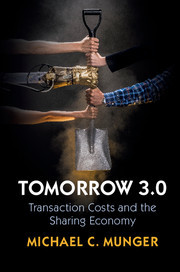Description
Tomorrow 3.0
Transaction Costs and the Sharing Economy
Cambridge Studies in Economics, Choice, and Society Series
Author: Munger Michael C.
Munger predicts that smartphones will allow the 'transactions cost economy' to commodify excess capacity, promoting sharing instead of owning.m
Language: English
Subject for Tomorrow 3.0:
Approximative price 26.37 €
In Print (Delivery period: 14 days).
Add to cart
Tomorrow 3.0
Publication date: 03-2018
Support: Print on demand
Publication date: 03-2018
Support: Print on demand
Approximative price 73.89 €
In Print (Delivery period: 14 days).
Add to cart
Tomorrow 3.0
Publication date: 03-2018
188 p. · 15.7x23.5 cm · Hardback
Publication date: 03-2018
188 p. · 15.7x23.5 cm · Hardback
Description
/li>Contents
/li>Biography
/li>
With the growing popularity of apps such as Uber and Airbnb, there has been a keen interest in the rise of the sharing economy. Michael C. Munger brings these new trends in the economy down to earth by focusing on their relation to the fundamental economic concept of transaction costs. In doing so Munger brings a fresh perspective on the 'sharing economy' in clear and engaging writing that is accessible to both general and specialist readers. He shows how, for the first time, entrepreneurs can sell reductions in transaction costs, rather than reductions in the costs of the products themselves. He predicts that smartphones will be used to commodify excess capacity, and reaches the controversial conclusion that a basic income will be required as a consequence of this new 'transaction costs revolution'.
1. The world of tomorrow 3.0; 2. Division of labor, destruction, and revolution; 3. The middleman-sharing economy; 4. The answer is 'transaction costs' – Uber sells triangulation, transfer, and trust; 5. Jobs, work, and adaptation; 6. The day after tomorrow.
Michael C. Munger is a Professor in the Department of Political Science and the Department of Economics at Duke University, North Carolina. He studied for a Ph.D. under Barry Weingast and Douglass North (1993 Nobel Prize) at Washington University in St Louis. After working at the US Federal Trade Commission, Munger taught at Dartmouth, Texas, and North Carolina before moving to Duke in 1997. He edited the journal Public Choice from 2005–2009.
© 2024 LAVOISIER S.A.S.




